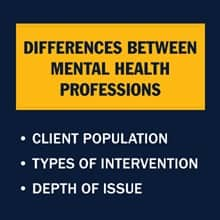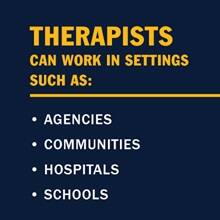How Long Does It Take to Become a Counselor

The word "therapist" is a broad term that can encompass many mental health professionals. Counselors, social workers, marriage and family therapists, and psychologists are all considered therapists.
Depending on the individual, the geographic area in which they practice and their respective state licensure or regulatory practices, many mental health professionals use the term "therapist" to speak broadly about themselves. Regardless of what term is used, providing mental health services to clients is a meaningful way to offer help and support to others at the individual and community levels.
While the term "therapist" is often used as a general term to encompass the mental health field as a whole, "it is important to note that there are very real and significant differences between and among the mental health professions," said Kristi B. Cannon, PhD, LPC, NCC, director of counseling programs, assessment and evaluation at Southern New Hampshire University (SNHU).
These differences include:
- The client population being served
- The types of intervention being offered
- The depth of the issue being addressed

While the term "therapist" can be used across professions, state licensure boards restrict the use of particular terms such as "licensed professional counselor" or "licensed psychologist" to "those who have received specific educational, exam and practice requirements for licensure in that area," Cannon said.
And, because educational training, ethical guidelines and licensure are critical to each of these fields, "it is important for potential clients to understand that the term 'therapist' is not regulated," Cannon said. Therefore, the term "therapist" can be used by anyone across the profession.
What's the Difference Between a Therapist and a Counselor?
These terms are often used interchangeably. "Both a therapist and a counselor engage in a helping relationship," said Metoka L. Welch, PhD, LCMHC (NC), director of counseling programs for the learning environment at SNHU. The difference between the two lies within the goal of the professional.
A therapist "provides mental health therapy to clients," Cannon said, while a counselor is a specific type of mental health professional whose offerings "align with a wellness model of healing" and who "believes in the empowerment of clients to accomplish their goals in mental health, career and education."
According to Cannon, some types of counselors include:
Just like with the term "therapist," there can be distinct educational, training and licensure requirements for each of these professions.
The type of professional counselor most often associated with "therapist" is a clinical mental health counselor. This person "is someone who provides direct client counseling in a private practice, hospital or community-based setting," Cannon said.
What Does it Take to Become a Therapist?
The first step toward becoming a therapist is to decide which type of therapy you wish to provide.
These are some common pairings of interests and career pathways, according to Welch:
- Social work is a good fit if you are interested in connecting people to resources
- Marriage and family therapy might be a good fit if you know you want to provide services to couples and families in a group setting
- Counseling or individual therapy is suitable for people who want to work with clients one-on-one
- Clinical mental health counseling can be good for people who want a broad scope of knowledge to help people with a variety of mental health needs

Once you have chosen your focus, the next step to becoming a therapist is to investigate the educational pathway you will need. An undergraduate degree is necessary to become a therapist in any area. "Most programs will specify if the degree for your chosen field needs to be in a social science, such as psychology, or a related discipline, such as sociology," Welch said.
If you already have a bachelor's degree in another field, do not worry. "It has been my experience," said Welch, "that counseling programs are understanding that people are often enrolling in counseling programs as a second career, so their undergraduate degree could be in political science or, in my case, English." Most bachelor's degrees will provide the foundational concepts and information you will need to move forward.
How Long Does it Take to Become a Therapist?
After you determine which area of counseling you would like to pursue, go to your state's licensing board website to determine what educational credentials you need. "Then, look into programs that offer the qualifying curriculum," said Welch.
A bachelor's degree is only the beginning, however. A graduate degree is needed as well. Some types of therapy practice, such as a counseling psychologist, "will need a PhD in counseling psychology as the minimum requirement for licensure," said Cannon. Other types of therapy practice require a master's degree.
Licensed professional counselors must have a master's degree in counseling, "which includes the educational requirements established by the state counseling licensure board" to practice, said Cannon.
While in school, you will likely complete a practicum and gain internship experience. Depending on your state and area of specialty, "you will need to complete 2-4 years of post-graduate experience in order to be licensed," Welch said. "I often tell students that (becoming a therapist) is a 2–5-year investment."
What Degree Do You Need to Become a Therapist?
For most therapist specialties, such as clinical mental health counseling or clinical social work, the minimum education needed is a master's degree.
A doctorate is required for certain specialty areas, such as a clinical psychologist or counselor educator. And to become a psychiatrist, "you need be a medical doctor," Welch said.
What Kind of License is Needed?
When it comes to how to become a licensed therapist, it's important to note that there are different types of licenses required for different counseling specialties. The type of license required is determined by the mental health field you choose and the state in which you will practice.
"Requirements for licensure include a set number of clinical hours completed under the supervision of an approved supervisor as well as passing required state licensure exams," Cannon said.
Different types of licenses include:
- Licensed clinical professional counselor (LCPC)
- Licensed professional counselor (LPC)
- Licensed clinical mental health counselor (LCMHC)
- Licensed marriage and family therapist (LMFT)
- Licensed clinical psychologist (LCP)
What's the Career Potential Like for a Therapist?
The demand is growing for therapists and mental health professionals. "This is due to a combination of factors," Cannon said, "including the fact that mental health issues have gained more prominence in society over the last few years."
The COVID-19 pandemic, as well as an increase in awareness of concepts like self-care, work-life balance and even mental health days, have helped "normalize mental health issues as part of a collective sense of overall health," Cannon said.
There are many possibilities to build a robust and meaningful career as a therapist. Often, when people think of being a therapist, "they think of working in private practice," Welch said.
Welch also noted that therapists could work in areas such as:
- Agency settings, where you could help connect clients with community resources
- Community settings, where you could provide mental health support in a prison, rehabilitation facility or mental health center
- Hospitals, where you could help connect patients to services after they are discharged, as well as providing mental health services to patients for substance abuse, geriatric mental health and more
- Schools, where you could provide services as the school psychologist
The combined awareness, acceptance and prominence of mental health issues and the need for care "is only growing the field, and I fully anticipate this will continue," said Cannon.
In fact, the US Bureau of Labor Statistics projects that employment of substance abuse, behavioral disorder, and mental health counselors will grow 23% from 2020 to 2030, which is much faster than the average for all other occupations.
Do Therapists Get Paid Well?
Because becoming a therapist is a tremendous time investment, you may not see a higher salary until you are licensed or working in a specialty. "Most people who go into this line of work do so because they had a personal experience with a counselor," said Welch, "or because they want to make a difference in the world. So, a good bit of the reward of being a therapist is intrinsic."
Depending on the educational background, license, area of client focus and geographic location, salaries can vary considerably. The Occupational Outlook Handbook of the U.S. Bureau of Labor Statistics notes a median pay range from $47,660 to $82,180 for mental health counselors and psychologists, respectively. Marriage and family therapists and social workers earn a median salary of just above $50,000.
What Makes a Good Therapist?
Being flexible, adaptable and empathetic are at the top of the list of traits that both Cannon and Welch say are important for a therapist to be successful. Welch also notes the ability to be courageous and set boundaries as necessary traits. The willingness to "constantly work on yourself, your biases and hidden assumptions" are essential traits for any therapist to succeed, said Welch. "The willingness to be a client yourself, and to recognize the strength of human resilience" are also important, she said.
All of these skills together enable therapists to help their clients strengthen their internal resources. "We want clients to use their own coping skills for the issues that come up in their lives," Welch said. This skill can take years to build, so the ability to continuously grow and learn is key as well.
The ability to embrace and weather change is also crucial. "I cannot stress enough how important it is to be able to deal with ambiguity," Welch said. "Often graduate programs in counseling are difficult for type-A perfectionists. You have to have a willingness to let go of what you think and become a student of the client's work."
What is the Job of a Therapist Like?
In clinical terms, a therapist "works directly with clients and provides some form of psychotherapy," Cannon said. In more personal terms, the role of the t
In terms of day-to-day responsibilities, the job can vary based on specialty. As a mental health counselor, Cannon works with clients one-on-one, with couples or families or in groups to provide direct mental health counseling services. The type of issues addressed can range from "life transitions to more significant and pervasive diagnosable mental health issues," Cannon said.
Therapy can occur in a private practice setting, such as in an office or via telehealth. A community mental health agency, hospital, school or outpatient program provides opportunities for practice as well.
The job itself can look very different setting by setting, therapist by therapist, because "the needs of clients and the services provided to those clients can vary" so widely, Cannon said. Regardless of the setting, the overall focus of a clinical mental health counselor is to "utilize a specific set of counseling skills, driven by an empirically valid theoretical orientation and interventions, to empower client growth and well-being," said Cannon.
Is Being a Therapist a Rewarding Career?
Both Cannon and Welch agree that being a therapist is a tremendously rewarding career. Welch acknowledges that helping clients work through issues can result in both small and large changes. The reward comes not from the size of the change that you help your client make but from helping clients "realize the possibility that things can change," she said.
For Cannon, being a clinical mental health counselor is a highly rewarding career:
"In my work, I have the capacity to empower and support people in meaningful ways every day of my life. For some clients, this may be as simple as working through a difficult decision or navigating a challenging relationship. For others, this could truly be fostering a will to live or work through a significant life trauma. Either way, I am hard-pressed to think of many other careers that center on such meaningful change and offer opportunities for such significant long-term impact."
What Are Some of the Biggest Challenges of This Profession?
As you might imagine, while the rewards of being a therapist are great, there are some significant challenges as well. "As much as this career can be rewarding," said Cannon, "it can also be emotionally and mentally taxing."
The biggest challenge, according to both Cannon and Welch, is the risk of burnout. "Therapists need to know their limits and ensure they are seeking good self-care" as part of their practice, said Cannon. The importance of self-care and personal therapy is often a part of therapist training, according to Welch.
Another great challenge is that of demand. The COVID-19 pandemic has increased the need for services, and, right now, "many licensed therapists have waitlists," said Welch.
What Advice Would You Give Someone Who is Considering This Profession?
Becoming a therapist is a big investment of time and energy. Because it can take years to achieve licensure and become qualified to establish a practice or work full-time in your chosen area, this is not a career field to enter into lightly.
This is also a field that can be very rewarding for some but is not the right fit for everyone. For that reason, it's worth taking the time upfront to research the different options within the field of therapy to decide if this is the right career for you. "This is not a profession you can just try out to see if you like it," Cannon said. Becoming a therapist takes some "front-end research, identity alignment and a commitment to the profession" before deciding if it's right for you, she said.
Welch advocates the importance of becoming a client yourself because "it takes a great deal of vulnerability to sit in the client's seat and reveal deep, often painful parts of your life to a stranger," she said. "Once you respect that position, you realize how sacred this work is." For that reason, she recommends having your own therapist because if the idea of that is off-putting to you, "reconsider why you want to do this."
Welch believes that the key difference between a good therapist and a great one is as simple as having the willingness to seek therapy yourself.
Marie Morganelli, PhD, is a freelance content writer and editor.
How Long Does It Take to Become a Counselor
Source: https://www.snhu.edu/about-us/newsroom/social-sciences/how-to-become-a-therapist